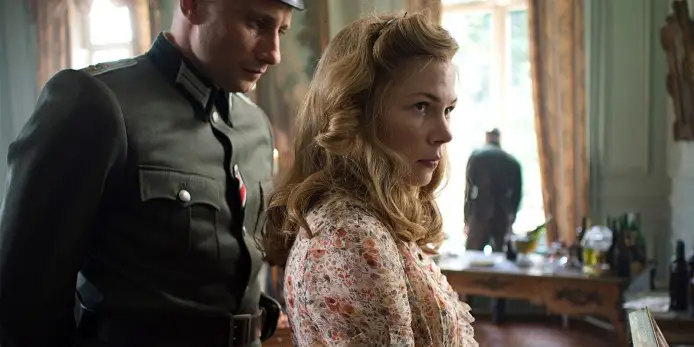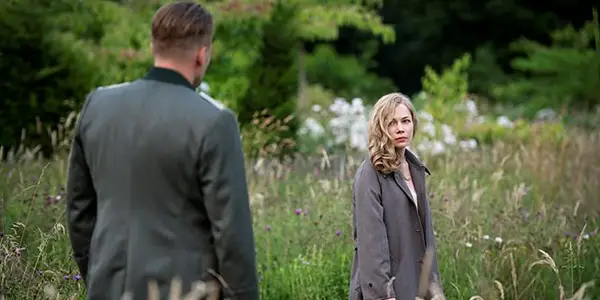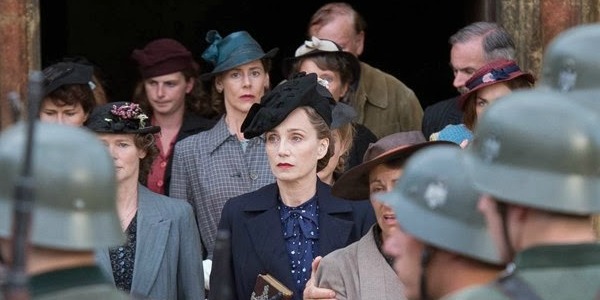SUITE FRANÇAISE: An Impressive Character Study

I love film, more than people probably, and I will…
Suite Française is an adaptation of Irène Némirovsky’s novel of the same name. Prior to seeing the film I had no knowledge of its provenance, and will withhold this particular information for now lest it misinform how you read the rest of this review. As always, I will attempt to remain objective. What I did know about Suite Française was that it was a story of a young woman in France during WWII who falls in love with a German Officer. I have a particular interest in the representation of women in WWII films, and a keen appreciation for Michelle Williams and Kristin Scott Thomas, so I went into the cinema optimistic.
Setting The Scene
Suite Française is the story of Lucile, a young woman who has found herself living with her mother-in-law Madame Angellier while her husband fights in the war. As the Germans invade and Paris falls, refugees set upon their town, along with the invading army as well. The Angellier house is to pay host to Lieutenant Bruno Von Falk, a quiet German officer, with whom Lucile falls in love. But I soon came to realise that Suite Française is much more than just a love story.
The first overwhelming feeling I had when Suite Française began was fear. I have watched a number of WWII films, but as a Brit I’ve always taken comfort in how we remained, in some way, removed from the war. This film takes place just after the events of Dunkirk. The Brits, for the most part, were gone, but the French remained, awaiting their fate. How scary that must have been, and how strange that we rarely see it addressed in films.

In the opening minutes we see the golden, sunny French countryside beset by Parisian refugees and German bombers as the war moves into Paris; a sight delivered to us through the sterling work of cinematographer Eduard Grau. The lighting and filming of this beautiful landscape draws a sharp contrast to the heavy metallic object that is the German army. This visual element contributes a great deal to the film’s theme of good vs. bad and light vs. dark, and it is a delight to watch.
It is a testament to the work of director Saul Dibb that I was so wrapped in the tension of this opening sequence that I found myself forgetting about the main storyline. But, that is not say that I missed anything either. In actuality, I was very impressed with how well the characters were conveyed in those opening moments. Madame Angellier (Kristin Scott-Thomas) from the start is shown to be a harsh woman, indifferent to others’ suffering but still with the suggestion of an emotional side. Lucile (Michelle Williams) is quiet but not weak under Madame’s gaze, and as we are introduced to the Angellier’s tenants, their looks towards Lucile suggest an understanding that she will be the one to help them.
The Good People
Suite Française’s strongest selling point, and theme, is in its understanding of humanity. The characters in this film are complex, in that they are not all good or all bad. The film is based in a small town called Bussy. As the Germans move into this small but not close community, each character is set upon a chain of events that will eventually bring out their true self.
Our central character is Lucile who, under the watchful eye of her mother-in-law, finds herself lonely and without any real purpose. But at the root, she is a passionate and caring person, and it is this that is drawn out of her when the Germans enter Bussy. Surprisingly, it turns out that her romance with Bruno, of which the storyline of the film is sold on, is not really of much consequence. It is almost a distraction, something that is there to test her in the light of greater concerns.
In any other film, a woman finding romance in the darkest of circumstances would have been all that you needed, but here it’s not. The whole point of Lucile’s story is that she strives to be a better person, and in the hands of Michelle Williams, I do not doubt her strength or resolve for a second.

Others in the town are locked on their own paths, dealing with the invasion as best they can. But it is in Madame Angellier and Bruno that the internal struggle for goodness is best seen. Madame Angellier is cold and selfish. But she also possesses a great strength, which you will come to realize can be harnessed for good. I have a great admiration for Kristin Scott Thomas already, and her keen character study in Madame Angellier is impressive.
Bruno has all the appearances of a soldier who is fighting against his will. He is strong and smart, but unlike the stereotype mainly found in films of this sort, he is not devoted to Lucile in private and scornful of her in public. He is honest and emotional throughout, and makes no effort to disguise his weariness. While Matthias Schoenaerts is not given much to do in the role of Bruno, his brief moment in the charge of a firing squad is impressive, and he gives Bruno the depth which is sometimes lacking in the character. It is this lack of depth which leads me to think that the film is misguided in portraying Bruno as some great romantic intrigue. His role is better served as a comparison to Madame Angellier.
We, like Lucile, are forced to see Madame Angellier as dominant and unfeeling, while Bruno is warm and emotional. She is the enemy while he is the saviour. But this simply isn’t the case. They are neither all good or all bad – they are people whose hands have been forced by the presence of war. This is a compelling idea because, unlike most films, the audience is forced to consider that maybe neither of them is right for Lucile. Maybe she is better alone.
A Story Well Told
To me, the romance of Lucile and Bruno is an interesting idea but really not the point. Whether this is because it isn’t well written or because it is in fact of so little importance, one cannot tell. Suite Française is really the story of a group of people and how they react when their humanity is tested.
The film’s story can perhaps be traced back to one point, the poverty of the Labarie family. Benoit Labarie has been injured in the years preceeding the war and is unable to fight. He is a bitter man and when his family is threatened by starvation and the entrance of a less than welcome German officer, he is forced to steal from the farm’s owners, the de Montmorts. As the situation spirals out of control, the characters are forced to pick sides in Benoit’s plight.

Is it of great credit to Saul Dibb and Matt Charman (the screenwriters) that even in the face of something so distracting as Lucile and life at the Angellier home, that the film remains focused on life at the Labarie’s farm. You wonder about the family, and you worry about them. So when, ultimately, Benoit is forced to go on the run, you are willing Lucile to find him.
The Legacy Of Irene Némirovsky
Irène Némirovsky was a successful author in the 1930’s before war broke out and she, on account of her Jewish ancestry, was sent to Auschwitz where she died of typhus in 1942. Although she could not get her work published after the German invasion, she continued to write. Suite Française was found by her daughter, in 2004, who had previously mistaken it for a writer’s notebook. The provenance of this book has had a great hand in its success, being as it is a work written in Nazi-occupied France, and also that it is not a diary of those events like so many other books.
It would be easy to dress Suite Française up as an important film because it is based on such a book. However, it is still a work of fiction, and one that remained unfinished by Némirovsky. So while it is uniquely written, we cannot assume it is more historically accurate than other sources. It would be better to treat it as any other work of fiction or, as it is, an interesting and important character study, looking at life during Nazi-occupied France.
Conclusion
Throughout this review I have referenced great character and story a number of times. However, you may have noticed that I have not been overly enthusiastic about the film. This is not necessarily because Suite Française is bad. On the contrary, it is an excellent film. But it is not a film that has been designed for shock and awe. It is a steady, slow-burning story, one made to fulfill and enlighten its audience.
Suite Française is very well made: the acting is good, as is the filmmaking. But it is in its story about the line between good and bad that cuts through each of us that the film really finds its strength. So, while I do recommend you watch this film, I also plead that you treat it for what it is – not as a great romantic tragedy, but as a story about a group of people living in difficult circumstances. If you see it like that, I think you may be impressed.
Have you seen Suite Française or read the book? What did you think about the adaptation?
(top image source: Entertainment One)
Does content like this matter to you?
Become a Member and support film journalism. Unlock access to all of Film Inquiry`s great articles. Join a community of like-minded readers who are passionate about cinema - get access to our private members Network, give back to independent filmmakers, and more.
I love film, more than people probably, and I will watch pretty much anything. Seriously, anything! I have a postgraduate education in film & have spent an exceptionally long time trying to get inside the film industry. I'm a big believer in treating every film the same, and bringing something new to the film theory table, giving reasons for every argument made. You'll find that I'm an empathetic and fun sort of reviewer, at least, I like to think so. If I'm not watching films I'm doing exceptionally nerdy stuff, like watching documentaries about the history of medicine and collecting photos of old post boxes.












